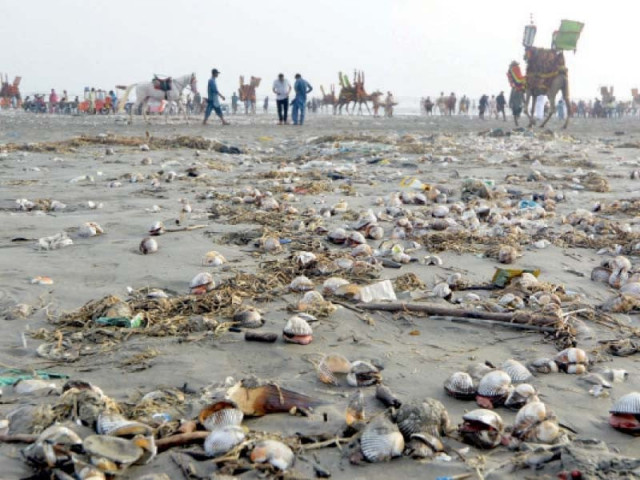Storm churns out trash from sea
Dead clams, mussel, fish, waste from ships strewn over beaches cause stench

High tides triggered by cyclone Biparjoy have churned out huge volume of garbage from the sea on the beaches of Karachi, Keti Bandar, and Jiwani.
Planks of rotting wood of scrapped launches, tons of plastic waste lies strewn on the beaches as sea has retuned the trash to its origin. Additionally, tons of dead clams, mussel and fish have washed ashore with the high tides causing an awful odour that hangs in the air along the beaches.
“It is the tropical storms season,” World Wide Fund (WWF) Technical Advisor Moazzam Ali Khan said explaining the cyclone Biparjoy. However, the changing weather pattern coincided with the lunar cycle that induces high tides resulting in heightened tidal activity which pushed trash out of the sea.
He said the garbage consists of a significant amount of wood, plastic, various types of discarded items, rubber, and dead aquatic animals.
“This accumulation has started to rot in the hot and humid water resulting in a foul odour in the vicinity of the beaches and an immediate clean-up is necessary,” Khan said.
The WWF adviser said that besides garbage a huge quantity of clams and mussel have also washed up on the beaches. He said that Pakistan is home to seven types of seashells, with areas of high abundance located in Clifton, Ibrahim Hyderi, and the creek areas of Sindh.
These types of oysters are also found in coastal areas of Balochistan such as Ormara, Pasni, Jiwani, and Gwadar.
Experts point out that these oysters are primarily harvested for meat, which is then traded and exported to Southeast Asian countries. The fan shell oysters are typically attached to rocks, and their shells are occasionally known to contain black pearls.
Published in The Express Tribune, June 18th, 2023.



















COMMENTS
Comments are moderated and generally will be posted if they are on-topic and not abusive.
For more information, please see our Comments FAQ